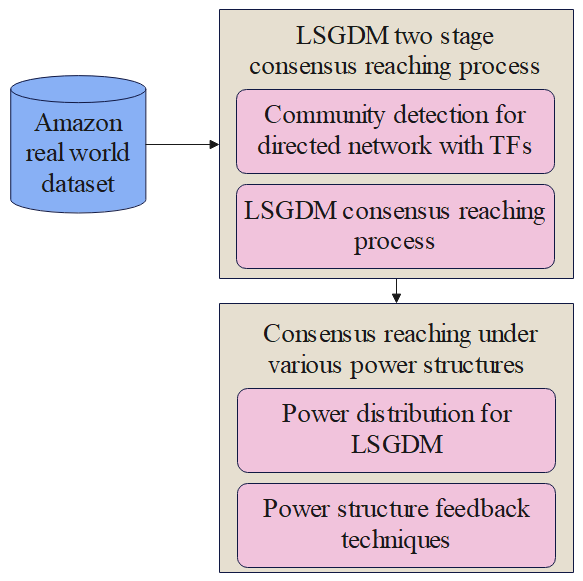LSGDM Two Stage Consensus Reaching Process for Autocratic Decision Making using Group Recommendations
Main Article Content
Abstract
The decision making is a general and significant action in day-to-day life. In some cases, experts cannot express their preferences using precise value due to inherent unreliability. The utilization of linguistic labels creates expert judgement more informative and consistent for decision making. The group recommendation is considered as a significant factors of e-commerce domain due to their direct impact on profit. The personalized experiments improve the engagement and the count of purchases of the customer when the recommended products are matched to the current interest.In this paper, the Large-Scale Group Decision Making (LSGDM) two stage consensus reaching process is proposed by using three various Amazon real world dataset.This proposed method permits an autocratic decision maker to utilize a different group recommendation for a sequence of decisions at highest level of consensus. The performance of the model is estimated by applying parameters like Root Mean Square Error (RMSE), Mean Absolute Error (MAE), Precision and Recall. The obtained result shows that proposed methodology provides better result while comparing various other methods.
Article Details
References
Li, S., Rodríguez, R.M. and Wei, C., 2021. Two-stage consensus model based on opinion dynamics and evolution of social power in large-scale group decision making. Applied Soft Computing, 111, p.107615.
Haseli, G., Sheikh, R., Wang, J., Tomaskova, H. and Tirkolaee, E.B., 2021. A novel approach for group decision making based on the best–worst method (G-bwm): Application to supply chain management. Mathematics, 9(16), p.1881.
Pujahari, A. and Sisodia, D.S., 2021. Preference relation based collaborative filtering with graph aggregation for group recommender system. Applied Intelligence, 51, pp.658-672.
Nafei, A., Javadpour, A., Nasseri, H. and Yuan, W., 2021. Optimized score function and its application in group multiattribute decision making based on fuzzy neutrosophic sets. International Journal of Intelligent Systems, 36(12), pp.7522-7543.
Wu, Y., Liu, Q., Chen, R., Li, C. and Peng, Z., 2020. A group recommendation system of network document resource based on knowledge graph and LSTM in edge computing. Security and Communication Networks, 2020, pp.1-11.
Stratigi, M., Pitoura, E., Nummenmaa, J. and Stefanidis, K., 2022. Sequential group recommendations based on satisfaction and disagreement scores. Journal of Intelligent Information Systems, pp.1-28.
Seo, Y.D., Kim, Y.G., Lee, E. and Kim, H., 2021. Group recommender system based on genre preference focusing on reducing the clustering cost. Expert Systems with Applications, 183, p.115396.
Pujahari, A. and Sisodia, D.S., 2020. Aggregation of preference relations to enhance the ranking quality of collaborative filtering based group recommender system. Expert Systems with Applications, 156, p.113476.
Srinivasa Reddi, P. ., & Sri Krishna, A. . (2023). CNN Implementing Transfer Learning for Facial Emotion Recognition. International Journal of Intelligent Systems and Applications in Engineering, 11(4s), 35–45. Retrieved from https://ijisae.org/index.php/IJISAE/article/view/2569
Afoudi, Y., Lazaar, M. and Al Achhab, M., 2021. Hybrid recommendation system combined content-based filtering and collaborative prediction using artificial neural network. Simulation Modelling Practice and Theory, 113, p.102375.
Wang, P., Wang, Y., Zhang, L.Y. and Zhu, H., 2021. An effective and efficient fuzzy approach for managing natural noise in recommender systems. Information Sciences, 570, pp.623-637.
Wan, S.P., Chen, Z.H. and Dong, J.Y., 2021. An integrated interval type-2 fuzzy technique for democratic–autocratic multi-criteria decision making. Knowledge-Based Systems, 214, p.106735.
Yera, R., Alzahrani, A.A. and Martínez, L., 2022. A fuzzy content-based group recommender system with dynamic selection of the aggregation functions. International Journal of Approximate Reasoning, 150, pp.273-296.
Elena Petrova, Predictive Analytics for Customer Churn in Telecommunications , Machine Learning Applications Conference Proceedings, Vol 1 2021.
Sojahrood, Z.B. and Taleai, M., 2021. A POI group recommendation method in location-based social networks based on user influence. Expert Systems with Applications, 171, p.114593.
Lyu, Z., Yang, M. and Li, H., 2021. Multi-view group representation learning for location-aware group recommendation. Information Sciences, 580, pp.495-509.
Abolghasemi, R., Engelstad, P., Herrera-Viedma, E. and Yazidi, A., 2022. A personality-aware group recommendation system based on pairwise preferences. Information Sciences, 595, pp.1-17.

